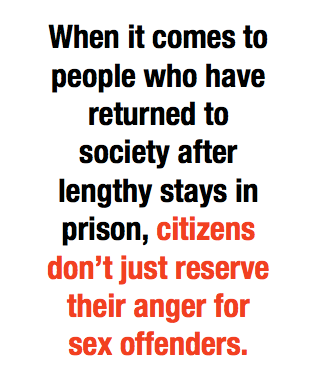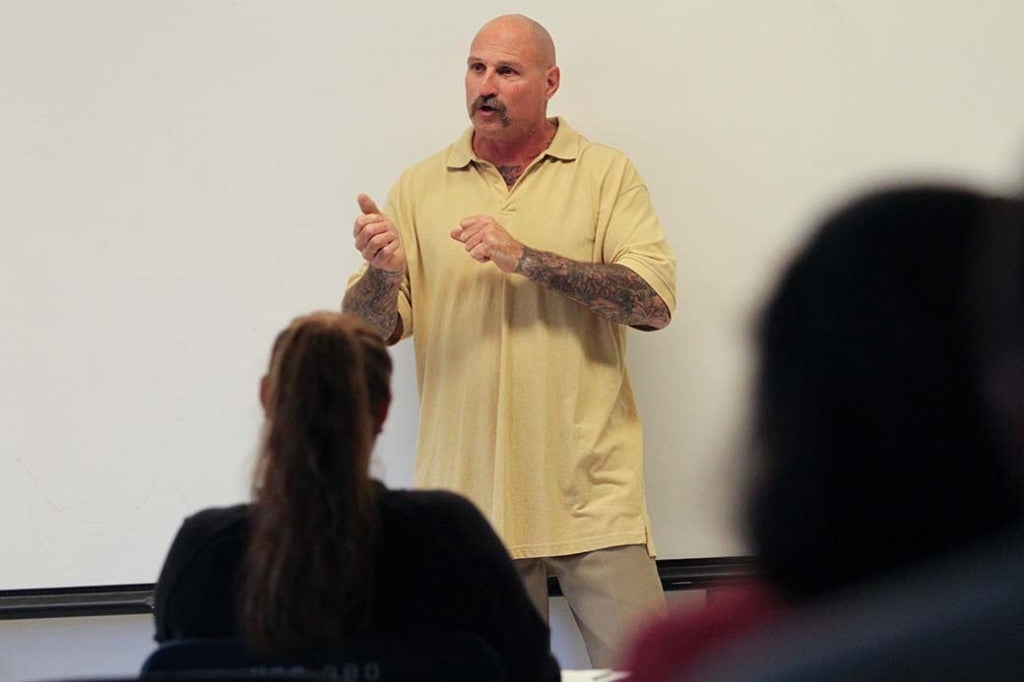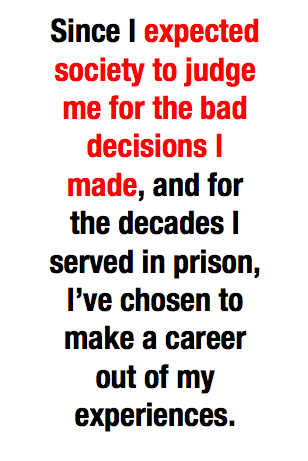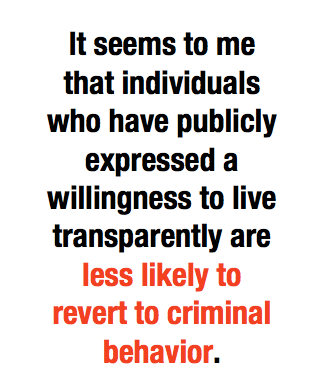By MICHAEL SANTOS
Carl Peterson, a middle-aged man who committed a sexual assault against his 13-year-old niece, tried to reconcile with his community publicly last week. It didn’t work out so well.
Mr. Peterson stood on stage in a town-hall meeting at Belmont High School on September 19. More than 100 people were in the audience. Community officials—including the police chief and a mental health professional, along with the offender’s wife—stood behind him. People in the audience were astounded when the man told them that he had served four years in prison for sexually assaulting his niece, that he had been receiving therapy for eight years, and that he was no longer a danger to the community. Some shouted in disgust, some told him to leave; a few others wanted to hear more about what he had to say.
When Franklin Tucker of the Belmont Patch published a story about the event, called “I’m the level 3 sex offender you all have been talking about,” hundreds of people commented. The story quickly went viral, with Gawker, The Huffington Post, New York Daily News and other Internet publications covering. The question about what should happen to offenders after they completed their terms drew, to put it mildly, polarizing views.
 When it comes to people who have returned to society after lengthy stays in prison, citizens don’t reserve their anger for sex offenders. I know from personal experience. Authorities released me from federal prison after longer than a quarter century. When I was 23, I began serving that sentence because a jury convicted me for crimes related to the distribution of cocaine. The San Francisco Chronicle published a front-page story describing all of the efforts I made to reconcile with society and to live as a law-abiding, contributing citizen. The article drew more than 200 comments. Despite my not having a history of violence or weapons, many citizens commented with the same types of vitriol as the Belmont, MA sex offender received.
When it comes to people who have returned to society after lengthy stays in prison, citizens don’t reserve their anger for sex offenders. I know from personal experience. Authorities released me from federal prison after longer than a quarter century. When I was 23, I began serving that sentence because a jury convicted me for crimes related to the distribution of cocaine. The San Francisco Chronicle published a front-page story describing all of the efforts I made to reconcile with society and to live as a law-abiding, contributing citizen. The article drew more than 200 comments. Despite my not having a history of violence or weapons, many citizens commented with the same types of vitriol as the Belmont, MA sex offender received.
The controversy caused me to question whether offenders could ever earn their way back into the mainstream of society. I am now a lecturer at San Francisco State University, and I discuss this very subject with the 65 criminal justice students enrolled in my course, The Architecture of Incarceration, on the evolution of punishment in Western Civilization.
First, we discussed the ways that society responded to people who broke the law during medieval times; then the Enlightenment era of the late 1700s and the punishment reforms that came with it. In medieval times we tortured offenders; after the Enlightenment era, we began to respond with incarceration.
When I asked the students how they would assess the level of change from medieval tortures to incarceration, on a scale of 1 to 10, the students overwhelmingly assessed the change as a 10. But when I asked the students how society’s responses to offenders has changed during the more than 200 years since we began relying upon incarceration as a response to crime, most of the students acknowledged that we haven’t advanced much. Society locked people in cages to punish them. Even after the sentence was served, many citizens didn’t want those offenders to live in the community. This basic fact still hasn’t changed. To make this point human, I’ve invited other offenders into my class as guest speakers and asked them to share their experiences.
 Last week, for example, Ronnie Massaro appeared in my class as a guest speaker. Ronnie served nearly three decades in prison. He told the students about his violent adjustment, which he found necessary to survive in the high-security prisons where he served his sentence. By the time Ronnie returned to society, four years ago, he said employers would not hire him because he had been missing from society for too long. Ronnie attended school, but years passed before he could land a job. He told my students at SFSU about the many challenges he faced despite his commitment to live as a law-abiding citizen.
Last week, for example, Ronnie Massaro appeared in my class as a guest speaker. Ronnie served nearly three decades in prison. He told the students about his violent adjustment, which he found necessary to survive in the high-security prisons where he served his sentence. By the time Ronnie returned to society, four years ago, he said employers would not hire him because he had been missing from society for too long. Ronnie attended school, but years passed before he could land a job. He told my students at SFSU about the many challenges he faced despite his commitment to live as a law-abiding citizen.
In my next class, DeAngelo Cortijo will speak. I expect him to describe the challenges he faced after his return to society following eight years of imprisonment that began when he was only 12 years old. While incarcerated, DeAngelo lost opportunities to educate himself or develop work experience. He lacked guidance on how to prepare for a law-abiding life. Instead, he had to learn how to survive the prison experience. Without a work history, he struggled to find employment that would pay him a livable wage. Mentors encourage him, and DeAngelo is committed to earning his education so that he can make meaningful contributions to society. Yet he expects to meet resistance every step of the way.
I myself concluded my 26 years as a federal prisoner on August 12, 2013. In this era of mass incarceration, however, society isn’t ready to look beyond the bad decisions of an offender’s past. I am now 49 years old and I’ve returned to society as a modern-day Rip Van Winkle, without credit or a work history. Since I expected society to judge me for the bad decisions I made during my early ‘20s, and for the decades I served in prison, I’ve chosen to make a career out of my experiences. Now I strive to help more offenders prepare for law-abiding life upon release. They face enormous challenges, including access to jobs, credit, housing, education, transportation, and so many others obstacles associated with reacclimating to society after imprisonment.
 A felony conviction and prison term carries lifelong consequences, regardless of what efforts an offender makes to reconcile with society or to atone. All criminal defendants face enormous challenges, but people who’ve been convicted of sex offenses may have the most difficult hurdles. Laws even restrict locations where they can live.
A felony conviction and prison term carries lifelong consequences, regardless of what efforts an offender makes to reconcile with society or to atone. All criminal defendants face enormous challenges, but people who’ve been convicted of sex offenses may have the most difficult hurdles. Laws even restrict locations where they can live.
I’m working to bring more awareness to the prison experience. I consider it my duty and life calling to help citizens understand that every individual has a capacity to change, to grow, to work toward reconciliation. As an enlightened society, we should strive toward a more restorative justice rather pursuing efforts to extract a pound of flesh, even after an offender serves his time inside.
From community leaders, I’m learning how to use the Internet and mass media to change the way that people perceive offenders. Scott Budnick, the well known Hollywood producer of “The Hangover” comedy movies, for example, began the Anti-Recidivism Coalition to bring more awareness to juvenile justice issues and to change laws. Bay area venture capitalist Chris Redlitz launched The Last Mile program in San Quentin to teach prisoners entrepreneurial skills, because he recognized the challenges they would face in finding employment upon release. Changing the way people perceive offenders begins with these types of activist efforts to change perspectives.
 I don’t know anything about Carl Peterson or his proclivity to reoffend. Yet it seems to me that individuals who have publicly expressed a willingness to live transparently are less likely to revert to criminal behavior. Offenders who speak freely about their past—a difficult thing to do, given the reactions they know they will face—demonstrate their commitment to living law-abiding lives.
I don’t know anything about Carl Peterson or his proclivity to reoffend. Yet it seems to me that individuals who have publicly expressed a willingness to live transparently are less likely to revert to criminal behavior. Offenders who speak freely about their past—a difficult thing to do, given the reactions they know they will face—demonstrate their commitment to living law-abiding lives.
Based on the polarizing views expressed in all of the Internet coverage of Mr. Peterson’s open forum, it seems that our society isn’t ready to contemplate the virtues of a restorative justice—one that would allow offenders to make amends with victims and with society as a whole.
Society still wants its pound of flesh.
Michael Santos is the author of numerous books that describe various aspects of the federal prison system. His most recent book, Earning Freedom: Conquering a 45-year Prison Term, shares events from the day of his arrest, on August 11, 1987 through the day of his release, on August 13, 2012. He speaks on subjects related to overcoming struggle and pursuing strategies for optimal personal performance. Michael makes himself available to answer any questions about his prison experience, his return to society after a quarter century in prison, or anything else. Follow him @MichaelGSantos.
Photo by Greater Manchester Police/Flickr
